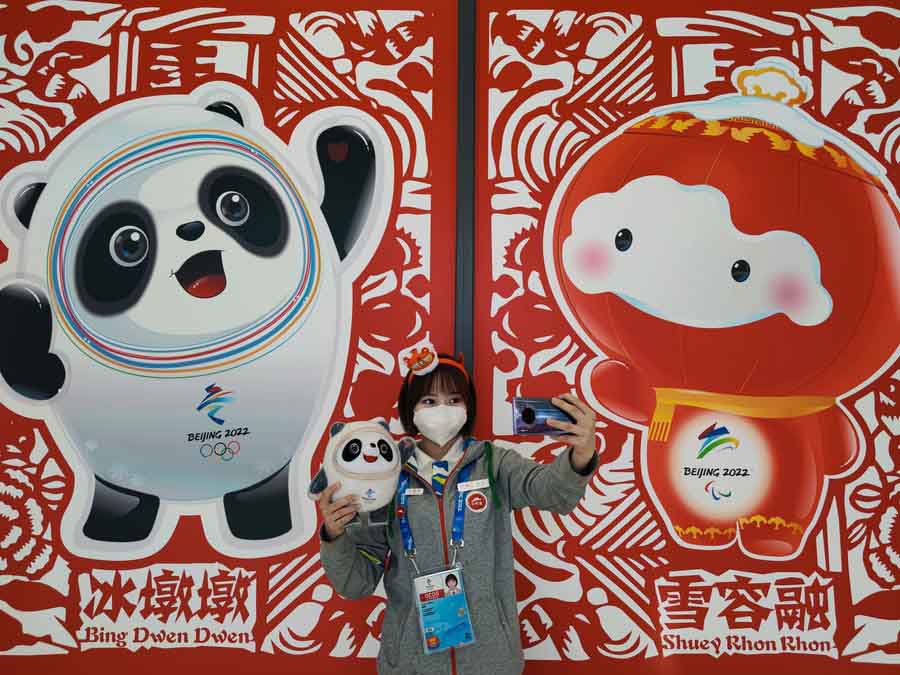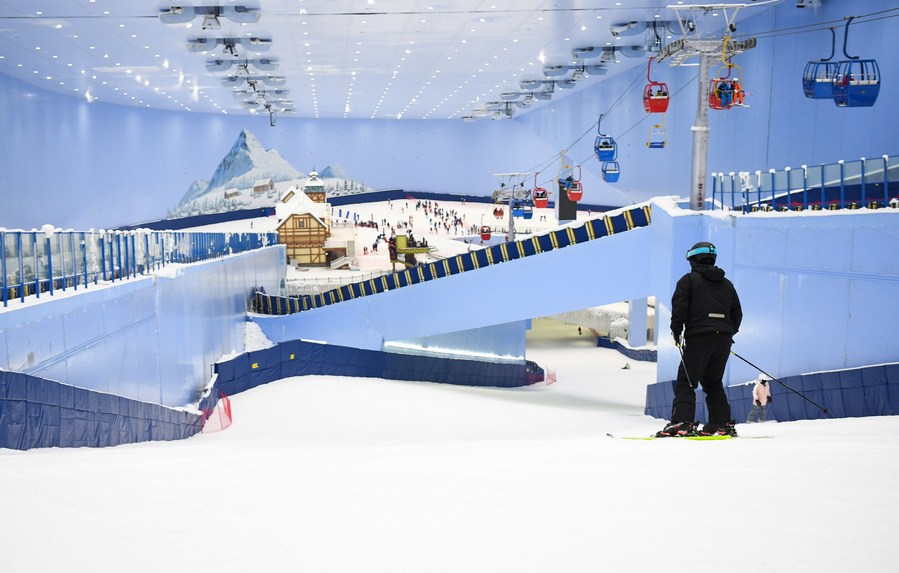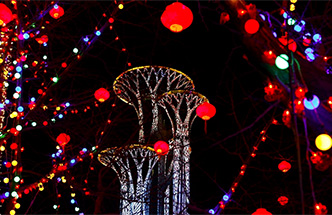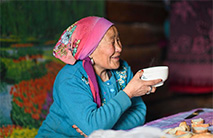What does Beijing 2022 hold for China and the world
-- By hosting the event, China is conveying a message of solidarity urging humanity to stay united in the face of global challenges including the raging COVID-19 pandemic.
-- Winning the bid to host the 2022 Winter Olympics more than six years ago has ignited a winter sports fever in the country.
-- The dream of building a nation strong in sports is closely related to the Chinese Dream, Xi said.
BEIJING, Feb. 2 (Xinhua) -- The Beijing Winter Olympics will raise the curtain on Friday, as thousands of athletes from across the globe gather in China for the first international multi-sport event to be held as scheduled since the COVID-19 pandemic.
Beijing 2022 will be attended by world leaders from dozens of countries including Russian President Vladimir Putin and heads of international organizations such as United Nations Secretary-General Antonio Guterres.
Meeting Thomas Bach, president of the International Olympic Committee (IOC), 10 days before the Games, Chinese President Xi Jinping said China is all set to deliver a "simple, safe and splendid" Games.
Xi has been the biggest champion of China's Winter Olympic drive after Beijing won the bid to host the Games. He has conducted five on-site inspections, and made multiple instructions.
Xi's vision of hosting the Games goes beyond sports. With the bigger picture in mind, he has designed Beijing 2022 to engage millions in winter sports in conjunction with the country's commitment to building a community with a shared future for humanity.
By hosting the event, China is conveying a message of solidarity urging humanity to stay united in the face of global challenges including the raging COVID-19 pandemic.

A volunteer poses for selfies at the Olympic Village for the Beijing 2022 Winter Olympics in Yanqing District of Beijing, capital of China, Jan. 31, 2022. (Photo by An Yaoyang/Xinhua)
WINTER SPORTS PASSION OF 300 MILLION
Xi said the primary goal of staging Beijing 2022 is to engage 300 million people in winter sports, and that it has become a reality.
An avid winter sports fan himself, Xi, as the country's top leader, has displayed visible enthusiasm in the run-up to the Games. During inspections and visits over the past years, he was seen brushing shoulders with a young ice hockey player, inquiring skiers whether the speed of the wind and the condition of snow could affect landing, and chatting with staff members in the skating oval to learn about ice making technology.
Winning the bid to host the 2022 Winter Olympics more than six years ago has ignited a winter sports fever in the country.
In Xi's words, the hosting of a Winter Olympics "would light the torch of winter sports."
From winter sports carnivals in Shanghai to the construction of skating and ice hockey facilities for kids in Guangzhou and Nanning, enthusiasm has swept through China, gripping even the country's tropical south.
"An increasing number of parents are keen on getting their kids involved in winter sports," said Zhang Peng, managing personnel with a skating club.
As of early 2021, China had built 654 standard ice rinks across the country, up a whopping 317 percent from 2015. The country also owns a total of 803 indoor and outdoor ski resorts.
"It is my goal to use sports as a bridge," Chinese freeskier Eileen Gu said, expressing hopes to become a role model or ambassador for her sport to possibly bring millions of Chinese females into the skiing fold.
"The most important part of the Olympic spirit is to popularize sports and encourage mass participation so as to improve people's health," Xi said.
He believes that the purpose of developing sports is to serve the people's needs for fitness and their well-rounded development.
Such instructions are a testament to the leadership's people-centered development philosophy, said Fang Xudong, an official with the General Administration of Sport of China.

A man skis at an indoor ski resort in Guangzhou, south China's Guangdong Province, June 19, 2019. (Xinhua/Deng Hua)
CHASING THE CHINESE DREAM
By hosting the 2022 Winter Olympics, Beijing is poised to become the world's first and only "dual Olympic city."
However, China today is much different from 2008 when it hosted the Summer Olympics. The country is now the world's second-largest economy and an upper-middle-income country with a per capita GDP of over 12,500 U.S. dollars. Over 400 million Chinese have entered the middle-income group.
Sport is a critical barometer of a nation's strength, and China's ascension to sporting excellence has revealed the country's growing vigor.
In the early 1900s, when a weak China was mocked as "the sick man of East Asia," "Tianjin Youth" magazine posed these questions: When will China send athletes to the Olympics? When will Chinese athletes win gold medals? When will China bring the Olympic Games to its own soil?
Cut to some eight decades later -- in 1984, with the advent of the reform and opening-up, China won its first gold in Olympics.
In 2008, China held its first Olympics around the time it overtook Germany as the world's third-largest economy. It was also the time when the U.S. subprime crisis sent financial shocks across the globe.
The history of China's involvement in the Olympics reflects the country's journey from poverty to prosperity, Jiang Xiaoyu, vice president of the Beijing Olympic City Development Association, had said.
In late 2012, after being elected general secretary of the Communist Party of China Central Committee, Xi put forward "the Chinese Dream" of national rejuvenation.
He said the dream of building a nation strong in sports is closely related to the Chinese Dream.
"The ultimate goal of building a sporting powerhouse and a healthy China is to strengthen the people's fitness, which also forms an essential part of China's endeavor to build a modern socialist country in an all-round manner," Xi said in January when inspecting the preparations for Beijing 2022 for the fifth time.
Photo taken on Sept. 17, 2021 shows the unveiling ceremony of the official motto for Beijing 2022 "Together for a Shared Future" in Beijing, capital of China. (Xinhua/Ju Huanzong)
"TOGETHER" FOR SHARED FUTURE
Beijing 2022 will be the second Olympic Games taking place in the pandemic following Tokyo.
With the Omicron variant rapidly outpacing Delta in most countries, epidemic control came as the biggest challenge for the Beijing 2022 organizers.
Globally, COVID-19 has killed more than 5 million people. According to the World Health Organization, over 21 million new cases were reported in the week ending Jan. 23, breaking the record of weekly new cases since the outbreak of the pandemic.
China, considered one of the safest places amid the pandemic, is facing its own share of challenges as sporadic outbreaks were reported in places including Beijing.
When Xi met Bach in late January, Xi emphasized the importance of "safety" for all participants of the event, relevant personnel and the Chinese people.
He called for strict adherence to closed-loop management measures to strengthen epidemic prevention and control when inspecting the Games' preparatory work on the first workday after the 2022 New Year holiday, his fifth inspection of the Games' preparation.
China's effective COVID-19 control has proven that Beijing is the right choice for 2022, said Yu Zaiqing, IOC vice president and vice president of the Beijing 2022 organizing committee.
But holding the Games against the backdrop of a pandemic has a deeper significance.
For the first time in over 100 years, the Olympic motto was updated last year, adding one of the most resonant words since the pandemic -- "together."
Bach said Beijing 2022 will be the chance to "live our new Olympic motto" to become stronger by standing together in solidarity.
Unity or solidarity is precisely the spirit Xi repeatedly emphasized in his phone calls and virtual summits with world leaders during the pandemic.
"What we discussed most was staying united to combat the pandemic," Xi said.
China led by example as it had provided over 2 billion doses of COVID-19 vaccines to more than 120 countries and international organizations. Xi announced last November that China will provide another 1 billion doses to Africa, including 600 million doses as a donation.
In January, when holding a summit with leaders of five Central Asian nations, Xi announced a series of significant measures to strengthen pandemic cooperation.
The Central Asian leaders stated that successfully hosting Beijing 2022 during a pandemic will undoubtedly instill greater confidence and hope in the world.
The notion of "Together," championed by the Olympic Movement, is needed more than ever, Xi noted.
"Instead of riding separately in some 190 small boats, countries around the world should stay together in one giant ship and sail toward a brighter future, and this is why we came up with 'Together for a Shared Future' as the official motto for Beijing 2022," Xi said.
Besides, the "green, inclusive, open and clean" approach to hosting Beijing 2022 is in the same vein as China's efforts to advance the Belt and Road Initiative and ecological progress.
Exuding sheer confidence, Xi has said -- "The world is turning its eyes to China, and China is ready."
Photos
Related Stories
- Safety first for Olympics participants
- Feature: "Snow princess" Gu Ailing set to shine at home Olympics
- 49-year-old German speed skater to become oldest woman to compete during Beijing 2022
- China aiming for best-ever Winter Olympic performance at Beijing 2022
- Italian figure skater eager to learn from the best at Beijing 2022
Copyright © 2022 People's Daily Online. All Rights Reserved.










